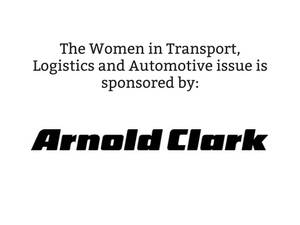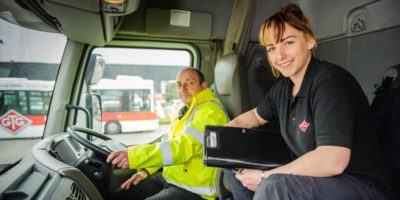Jo Miller is chief executive at Doncaster Council and president of SOLACE [Society of Local Authority Chief Executives]. Prior to joining Doncaster Council, Jo was deputy chief executive at the Local Government Association, responsible for policy, communications and sector led improvement, which included a four month secondment to Doncaster at the Government’s request. Jo studied law at the University of Southampton and began her career as a lawyer, working predominantly in the public sector in head of legal service roles, before taking a wider brief at Knowsley Council as executive director to lead on corporate resources and service transformation, and transitioning into broader leadership roles.
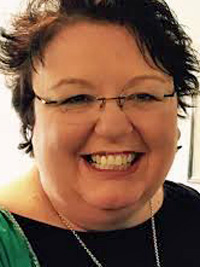
“…It’s vitally important that the next generation of decision makers around our transport and infrastructure represent the population of the country, 50% of which is female…”
From a child receiving free school meals to chief executive
I’ll start by saying that I was a child from a one parent family, living on a council estate in Liverpool and I received free school meals. I grew up in Liverpool in the 80s and I didn’t really intend to work for a council, but I believe that great public services can enable places and people to thrive. The reverse is also true.
I started my career as a trainee solicitor and holding a number of legal posts before becoming executive director at Knowsley Council, deputy chief executive of Bradford Council and deputy chief executive at the Local Government Association [LGA]. While with the LGA I was responsible for policy, communications and sector led improvement, which included a four-month secondment to Doncaster at the Government’s request back in 2010.
I became the chief executive of Doncaster Council in 2012 and I have overseen major financial, cultural and economic change programmes, which have significantly improved Doncaster’s position. I am the lead for Skills and Devolution Governance for the Sheffield City Region and was elected SOLACE [Society of Local Authority Chief Executives] president in October 2016.
When I came to Doncaster initially it was a failing council, considered one of the worst performing in the country and in effect had been taken over by Government. Having mapped out the initial improvement journey, and fallen for Doncaster’s huge potential, I knew I wanted to be its permanent chief executive as soon as the role was available.
I became chief executive 18 months later. These were incredibly challenging times but I could see what was possible and knowing that places and people can thrive through good public services and leadership I was determined to turn the council around.
Together with Mayor Ros Jones we have done a good job, but our ambition is high and we want to do more. In 2014, the council was released from special measures a year ahead of time and the town’s fortunes are on a steep upward trend. I am rightly proud of the journey we are on, and of the efforts of all those people who have contributed to that.
Looking at things differently in order to do more with less
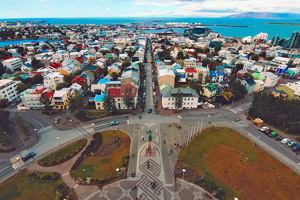
No two days are the same. Doncaster has 305,000 people – slightly more than the city of Newcastle and slightly less than the Iceland. Overall, between capital and revenue we’re running a £900 million turnover public services operation, which has seen a 40% reduction in its cost base since 2010.
These are unprecedented times for all local authorities. Needing to find ways to deliver good services for our residents with significantly reduced budgets means looking differently at how we do things.
My role is to work with the elected mayor to lead the workforce, steering the direction we need to take, working better and closer with our public-sector partners, voluntary and community groups and the business community to develop joined-up services for the benefit of our residents.
To achieve this goal, we have adopted a new four-year strategy, which will shape the next chapter of our improvement journey. It sets out a confident and bold ambition for Doncaster’s future grounded in securing good economic growth that all of our communities can benefit from – reducing the skills gap and improving median wages are vital.
Focusing on the issues that matter most now and in the future, we can find new ways of working that respond to these needs and opportunities. Our core themes are learning, working, caring and living and by shaping how we all work together to achieve these goals exciting times lie ahead for Doncaster.
Addressing gender imbalance through meritocracy
You only have to look at the recent uproar over BBC’s top paid stars being male dominated to see there is still a gender imbalance which must be addressed.
Even local government which prides itself on being inclusive has only about one-third of its chief executives as women and when you think approaching four-fifths of local government workers are female – it is simply not good enough. Nationally, Mayor Ros Jones and I are the only all-female elected mayor and council chief executive combination. Doncaster women make up 56% of our top 5% of earners, so we are making progress.
We need meritocracy with roles given to people with appropriate talents and skills. We also need women to believe in their abilities and go for more of the top roles.
Bringing the new High Speed College for Rail in Doncaster
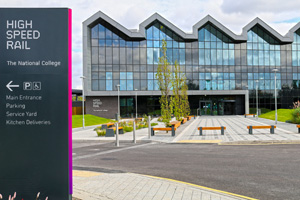
I led the team that bid for the college, so I’ve been there from the start. This borough was the zenith of industrial design at the turn of the last century with the Mallard and the Flying Scotsman, so as its heritage is in rail it’s beyond exciting that it’s also our future as well with lots of rail businesses here. We bid for it on that basis and we won! We were the outsider when we submitted the bid but we were determined to get it, so we galvanised all of the North to help us.
It’s going to train around 900 learners per year and the jobs they can go on to get are paying £40,000 plus. It’s phenomenal, not just for Doncaster but for those places we’re connected to. It’s no surprise that diversity is at heart of what we’re trying to do in terms of getting there.
The college will train people at high levels around industrial design, BIM [building information modelling], track management, rail management, controlling tracks digitally and provides a hands-on learning experience. We’ve got about £5 million worth of equipment from rail businesses to help us on our way.
We have an old Eurostar high speed train that the fantastic female chief executive of the Rail College, Clair Mowbray and I secured from international rail business, Alstom, that creates an in-cab experience for learners to go in, put their virtual reality goggles on, and, before there’s a piece of high speed track in the country, they can experience a learning environment around what they need to know in order to make that happen. There’s interactive boards where you can draw digitally and all the exciting stuff you’ve only ever seen previously in movies.
The official opening is in the middle of October and we’ll be welcoming learners in thereafter, starting mostly in the New Year.
Why it is vital to get girls and women involved
We engaged women in the design of the college We deliberately didn’t want a design that looked like it was a place where only boys would go.
The number of people we need to work in rail over the next ten years is around 40,000, so, if we don’t engage across genders and across social strata we won’t be able to get enough people to do the jobs that the country needs. Also, we get better decisions and better products when we have diversity in making them.
It’s vitally important that the next generation of decision makers around our transport and infrastructure represent the population of the country, 50% of which is female.
People’s Powerhouse event
When I received an invite to the Northern Powerhouse conference in Manchester earlier this year and saw 15 male speakers advertised and no women, I was frustrated and disappointed. In this day and age, it is not good enough and I always make a point of not attending events where all the speakers are male.
My mum said to me: “If you don’t like something, change it, and if you can’t change it, change your attitude.” I wasn’t very happy about the lack of diversity, not just in the line-up and the marketing, but also in the types of conversation that were taking place around the Northern Powerhouse.
Diversity needs to be at the heart of the Northern Powerhouse and so that’s why together with Donna Hall, chief executive at Wigan Council, we decided to organise the People’s Powerhouse event in July.
Held at Doncaster’s Keepmoat Stadium we had over 250 delegates attend to hear how people and communities need to be at the centre of Northern Powerhouse plans. It was an opportunity to share experiences, learn from each other, debate policy and other issues with people from a range of experiences, backgrounds and disciplines. The event was a great success with some fantastic debate.
People say it was very liberating. We crowdsourced all the workshops and thought about how we could re-design the city’s public services. All credit to the Northern Powerhouse event organisers, they came along too. We’re now working with them to make their future events more diverse.
In a world where we all work together and share the rewards, everyone’s better off. The best decisions are made by groups of people who broadly reflect the population and we need to get much better at this in local government. We’re just about to finish of a report around some of the outcomes so hopefully I’ll be able to tell you more about that soon.
The success of this nation
Needs not discrimination
But participation, collaboration
And co-operation from all pic.twitter.com/mZu3ATIL0N— People’s Powerhouse (@PeoplesPowerhse) September 28, 2017
Unlocking female potential and ensuring regeneration isn’t just about ‘boys toys’ and male led models of growth
I’m fuelled by a belief that strong vibrant economies require strong cohesive communities, that growth needs to be good growth, and that a rising tide does not float all boats. Sadly, unless you intervene and assist, a rising tide doesn’t always float all boats. The mayor and I don’t believe you can have a strong, thriving economy without strong, thriving communities.
We need to design communities with people in mind, attract growth with people in mind and do things with people, not to people and encourage their contribution. This is the only way to deliver good sustainable growth that works for everyone.
If people don’t feel that they can participate in growth, that they can see the benefits of it, that’s how you end up with extreme political situations. So, yes, our vision is to grow the economy, but it’s also to make sure local people can participate in it by having the right skills so they can access those new jobs and opportunities.
“…open the doors of this powerhouse and let the people in…”
What you do, how you do it, and having people at the heart of decision making really matters and pays dividends. In the words of Mayor of Greater Manchester, Andy Burnham, one of our guest speakers at the People’s Powerhouse conference, “open the doors of this powerhouse and let the people in.”
Economic growth is inextricably linked to improving the life chances of everyone. All areas of the country have diverse communities and to capture the vital inclusive growth, towns and cities need, everyone regardless of their gender, race or beliefs should be embraced and encouraged to play their part. We need inclusion at every level so we live better and live better together.
If you look at my career, I started as a scale 1 employee in local government, and I don’t think I ever intended to end up as CEO – but here I am. It’s not about where people start, it is about where we can take them. If I take local government, women make up most of the workforce but they don’t necessarily hold a leadership position.
At SOLACE and Doncaster Council, on my watch, we won’t be having all-male panels or all-male approaches to things. We will be diverse and reflect the diversity of our workforce and communities. From my perspective, it’s about recognising talent, nurturing it and rewarding it. Women are more than capable of taking leading roles and delivering.
Huge opportunity to collaborate and share ideas
We will we soon be launching our new four borough strategy, which will provide the focus for the council and Doncaster to grow and develop. We are still faced with significant reduced budgets due to the massive funding regime change. We have so far managed this well through innovation but I will need to navigate our path closely in the coming years.
We also have devolution and Brexit on the horizon. Devolution is an opportunity for local government to act as a first amongst equals to bring public services and businesses together. It is vital money spent in local places is spent in the best way possible to deliver for local people. We must get this right if we want to deliver real solutions for real problems.
There is also a huge opportunity for all sectors across the North to collaborate and share ideas, and bring back the best ideas that can be implemented elsewhere. We want to find new ways of making it easier to influence policy and decision making, spot innovations and help share what’s working by bringing private, public, voluntary and community voices together in a new way across the North.
Passionate and proud: Having a plan, signing everybody up to it and then cracking on
I am passionate and proud about great public services and I will continue to focus on doing the right thing for our residents so we have strong and resilient communities that can flourish and take advantage of future opportunities.
I’m just about to go into a full council meeting where I’m presenting our partnership plan for four years, which is about how we prepare all of our children and young people for a life that’s fulfilling. It’s also how we create purpose and meaning to allow more people to pursue ambitions in their work.
It’s also about how we live in a vibrant place so people love staying here, and also how we care for the most vulnerable in our communities. That includes things like new school places, new routes to work, brand new development projects, and new ways of working with adults that see them as assets. In Doncaster, for example, our employment levels are at an 11-year high and we’re incredibly proud of that. Our housebuilding is also at an 11 year high.
We want communities who can do things for themselves too. We have 145,000 hours of volunteering in the borough in the last eight months alone.
This plan is about to be launched and I’m organising all the organisational development sessions with my staff and workforce to make sure we then deliver it. I’m a great believer in having a plan, signing everybody up to it and then cracking on.
Good Morning! #Doncasterisgreat pic.twitter.com/k2pnJ94yZl
— Cast (@castindoncaster) September 26, 2017
I’d encourage everyone to come and visit Doncaster. It’s a fabulous place. We’ve got a wonderful theatre. We’ve got a market with delis that are as good as any you’ll find in Borough Market. We’ve got the Yorkshire Wildlife Park. Come along and you’ll be amazed. It’s a very special place.
https://twitter.com/MyDoncaster
https://twitter.com/jomillerdonny
https://www.facebook.com/NCollegeHSR/
Main image credit: National College for High Speed Rail.
From left to right – Jo Miller (chief executive, Doncaster Council), Alex Burrows (marketing and strategy director, Alstom), Clair Mowbray (chief executive, National College for High Speed Rail), Ros Jones (Mayor of Doncaster).


